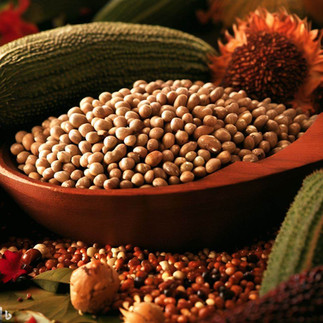Rediscovering Ghana’s Lost Ancient Crops: Bambara Groundnuts
- OTI Editor

- Aug 7, 2023
- 3 min read

Ghana’s lost ancient crops are valuable resources that deserve more attention and support. Cultivated for centuries, these crops are drought-tolerant and nitrogen-fixing that improve soil fertility and crop rotation. They offer many advantages and benefits for food security, nutrition, health, income generation, and environmental sustainability in Ghana and beyond. They also enhance the diversity and identity of Ghanaian cuisine and culture. In this edition dedicated to the lost ancient crops from Ghana, we focus on Bambara groundnuts (Vigna Subterranea).
Bambara groundnut is a grain legume that is native to West Africa and widely cultivated in sub-Saharan Africa and has been cultivated for centuries. Bambara groundnut is a drought-resistant and low-fertility crop that can provide high protein and carbohydrate for food security. In Ghana, Bambara groundnut is mostly grown in the Coastal Savannah, Transition and Guinea Savannah agro-ecologies. These areas have relatively low rainfall compared to the high rainfall areas in the country.
Bambara groundnut is sometimes planted on yam mounds, protecting the mound from erosion. It is also grown in intercropping systems with maize, millet, sorghum, cassava, yam, etc. This crop has a nutty flavor and a crunchy texture. Bambara groundnut can be processed into various food forms, such as eaten raw, roasted, boiled, or ground into flour, and turned into milk, oil and dumplings, and can be used to make soups, stews, sauces, cakes, or beverages. They are rich in carbohydrate, protein and fat. Bambara seeds contain phytochemicals such as flavonoids and tannins, which are more abundant in dark or red-colored seeds.
The Health Benefits of Bambara Groundnuts (Seeds).

Bambara seeds have many health benefits, including the following:
The crops of Bambara are a good source of protein, carbohydrate, fat, fiber, minerals and amino acids, which are essential for human health.
They can help to regulate blood glucose levels and prevent or manage diabetes, as they have a low glycemic index and high soluble fiber content.
Bambara groundnuts can help to prevent colon cancer and cardiovascular disease, as they have high antioxidants and soluble fiber that can lower cholesterol levels and protect the colon cells.
The gluten-free crop can help to improve bone health, as they contain calcium, phosphorus and lysine, which are important for bone formation and calcium absorption.
They can help to boost immune health, as they contain vitamin C and iron, which are involved in immune responses and preventing infections.
Bambara groundnuts can help to treat some diseases such as venereal diseases, diarrhoea, nausea, osteoarthritis, irregular menstrual cycle, etc., as they have anti-inflammatory, anti-microbial and anti-spasmodic properties.
Nonetheless, the crop is still underutilized and neglected due to its tedious harvesting and processing, and its limited popularity in the markets. The annual yield of Bambara groundnut in West Africa varies, depending on the production area, crop management and environmental factors. It is believed that the average yield of Bambara groundnut in Africa is 0.85 t/ha, with a total production of 0.3 million tons annually. However, the yield potential is reported to be over 3 t/ha1. Some of the top producing countries in West Africa are Burkina Faso, Niger and Cameroon. The yield ranges from 500-2600 kg/ha in different regions of West Africa. There are ongoing research efforts to improve the traits and yields of Bambara groundnut and to disseminate its benefits to farmers and consumers.
Initiatives To Improve the Yields of Bambara Seeds
The Bambara groundnut: an exemplar underutilized legume for resilience under climate change project, which aims to assess the genetic diversity, agronomic performance, nutritional quality, processing methods and market potential of Bambara groundnut in different regions of Africa and Asia.
The Breeding Potentials of Bambara Groundnut for Food and Nutrition Security in the Face of Climate Change project, which focuses on the application of molecular marker techniques and next generation sequencing technologies to unlock the hidden potentials of Bambara groundnut genome for improving yield, quality, stress tolerance and disease resistance.
The Bambara Groundnut Production Systems: A Review project, which reviews the current status, challenges and opportunities of Bambara groundnut production systems in Africa, and provides recommendations for enhancing its productivity, profitability and sustainability.
It's important to integrate Bambara seeds in our daily dietary, as these forgotten ancient grains are nutritious, drought-resistant and N-fixing legumes that can improve food security and health in Africa.
By rediscovering and promoting these crops, we can help preserve and celebrate Ghana’s rich agricultural heritage and create new opportunities and markets for farmers and consumers who are looking for diverse and quality products. - Esthy Asante, CEO and Head of Business Development of Organic Trade and Investments (OTI)


































































Comentários